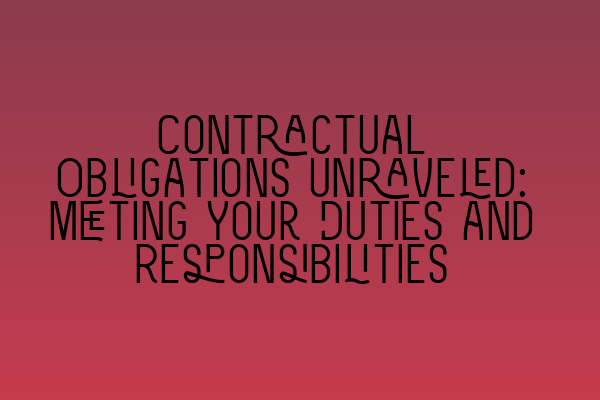Contractual Obligations Unraveled: Meeting Your Duties and Responsibilities
Contracts are the lifeblood of any business or legal relationship, as they lay down the foundation for the rights and responsibilities of all parties involved. Whether you’re a business owner, freelancer, or simply a responsible individual, understanding and meeting your contractual obligations is essential for maintaining trust, avoiding disputes, and fostering successful partnerships.
In this blog post, we will unravel the intricacies of contractual obligations, discussing the key elements that constitute a legally binding agreement, the types of obligations that may arise, and how you can ensure compliance with your contractual duties.
The Building Blocks of a Contract
Before diving into the specifics of contractual obligations, it is crucial to grasp the fundamental elements that constitute a valid contract:
- Offer: The initial proposal made by one party to another, indicating their willingness to enter into an agreement.
- Acceptance: The unqualified agreement by the other party to the terms of the offer.
- Consideration: The exchange of something of value, such as goods, services, or money, between the parties involved.
- Intention to create legal relations: The mutual understanding that the parties intend to be legally bound by the contract.
- Legal capacity: The parties involved must have the legal capacity to enter into a contract. This includes being of sound mind, being of legal age, and not being under duress or undue influence.
Once these essential elements are present, a contract is formed, and both parties are bound by their respective obligations. These obligations dictate the duties and responsibilities that each party must fulfill.
Types of Contractual Obligations
Contractual obligations can vary widely depending on the nature of the agreement and the specific terms negotiated between the parties. Here are some common types of contractual obligations:
Payment Obligations
One of the most prevalent obligations in contracts is the payment obligation. This entails the timely and full payment of any agreed-upon sums, whether it be for goods, services, or other considerations. Failing to meet payment obligations can lead to legal consequences, such as breach of contract claims.
Performance Obligations
Performance obligations involve the delivery of goods, completion of services, or other actions as stipulated in the contract. These obligations require the parties to meet certain quality standards, adhere to deadlines, and fulfill all agreed-upon requirements. Proper performance is essential to ensure the satisfaction of all parties involved and to avoid potential disputes.
Confidentiality Obligations
In certain contracts, confidentiality obligations may arise. These obligations require parties to maintain the confidentiality of sensitive information shared during the course of the agreement. Failing to uphold confidentiality obligations can result in detrimental consequences, such as the loss of trade secrets or breaches of client confidentiality.
Non-Compete Obligations
Non-compete obligations prevent parties from engaging in competing activities during or after the contract’s duration. These obligations are commonly seen in employment contracts or business partnership agreements and aim to protect the legitimate interests and investments of the parties involved.
Ensuring Compliance with Contractual Obligations
Meeting your contractual obligations is vital for building and maintaining strong business relationships. Here are some tips to help you ensure compliance with your contractual duties:
Thoroughly Review the Contract
Before signing any contract, it is crucial to thoroughly review and understand all its terms and conditions. Pay close attention to the scope of your obligations, any deadlines or performance standards, and any potential consequences for non-compliance. If you have any concerns or questions, seek legal advice to ensure clarity.
Document and Track Obligations
Proper documentation and tracking of your obligations can help you stay organized and ensure compliance. Keep copies of all relevant documents, such as invoices, delivery receipts, or service reports. Implement a system to track key milestones, deadlines, and payment schedules to avoid any lapses or delays.
Communicate and Collaborate
Clear communication is crucial for meeting contractual obligations. Regularly communicate with the other party to discuss progress, address any challenges, and ensure everyone is on the same page. Collaboration and open dialogue can help identify any potential issues early on, allowing for timely resolution and mitigation of risks.
Seek Legal Assistance
If you are uncertain about any aspect of your contractual obligations or if a dispute arises, it is advisable to seek legal assistance. A solicitor specializing in contract law can provide expert guidance, help negotiate resolutions, and protect your rights and interests.
Understanding and meeting your contractual obligations is key to maintaining successful professional relationships. By grasping the building blocks of a contract, recognizing the different types of obligations, and implementing best practices for compliance, you can navigate contracts with confidence and ensure a smooth and fruitful business journey.
For more related articles on legal practice, contract law, and tips for solicitors and lawyers, please check out the following links:
